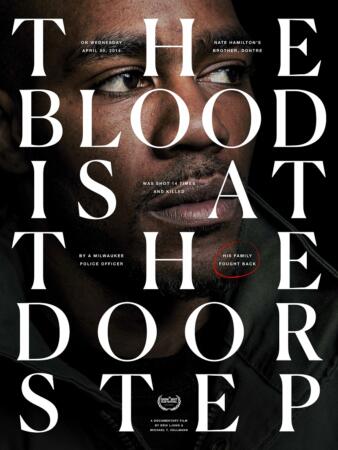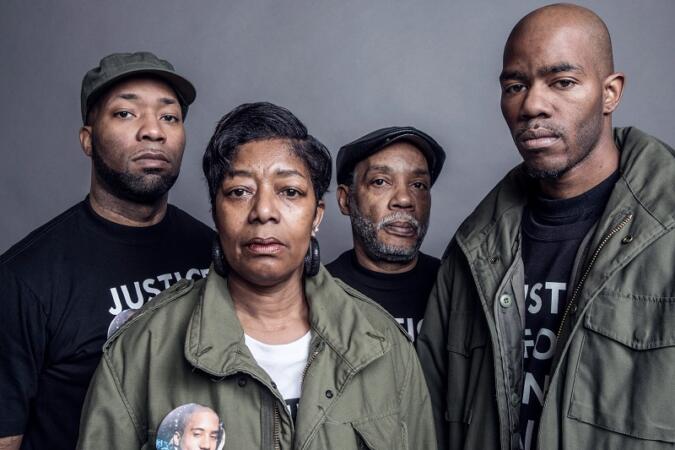
Many of you reading this, I suspect, can still remember the very first time that you saw photos of 14 year-old Emmet Till after he had been lynched by white men in Mississippi, following a false accusation of flirtation by a white woman. I still shocks me to think that Mamie Till Bradley had the strength—and really, the genius—to demand an open casket for her child. And to this day it remains ever clear that people are almost always politically activated by a personal connection to a crime against humanity. Bradley wanted the world to feel some tiny sliver of what she felt, to hear the name “Emmett Till” and have some sort of personal, if devastating, connection to the slain boy. How else will we know exactly what we’re up against?
Director Erik Ljung attempts to capture a similarly devastating picture of the violence white supremacy inflicts on individuals and communities with “The Blood is at The Doorstep,” which makes its premiere at this year’s SXSW. While it’s true that Dontre Hamilton was murdered in cold blood by a Milwaukee Police Officer, it’s not the visual of Dontre’s body that haunts the viewer when the film is over, but the images of the officers, prosecutors, politicians, white civilians and even members of the Department of Justice, who all participated in a crime against humanity when they refused to hold Christopher Manney accountable for killing an unarmed, 31 year-old man with mental health issues.
The story of Dontre’s murder is as infuriating as those many others we now know too well. It is, perhaps, more infuriating because Dontre was a schizophrenic. And also because Starbucks employees repeatedly called the cops on him in a single day, assuming that he was a homeless man in the park. When you learn that the first police officers called on the scene even told the employees to stop calling them, the ordeal is far more infuriating—they continued to call until Officer Charles Manney showed up and unloaded 14 bullets into Dontre’s body. Manney, in his initial call for help after the killing, admitted that he didn’t even know if he’d been touched by Dontre (he would later claim that Dontre beat him with his baton so severely he feared for his life, though no wounds or signs of struggle were found anywhere on his body).

Had Ljung simply presented the facts of the case as a critique of police and a racist, one-sided criminal justice system, “The Blood is at The Doorstep” would have still been a powerful experience. But instead of focusing solely on the murder and investigation, Ljung tells the story of Dontre’s close-knit family, with special attention given to Dontre’s brother, Nate Hamilton, who becomes an activist and co-founder of the Coalition for Justice following his brother’s death. The documentary spends a good deal of time in the home where Dontre grew up, in his neighborhood and among his friends and family. In this way, Ljung’s film insists that we understand state-sanctioned police brutality not as a single act of violence against a single person, but an act of terror against a family and a community.
Throughout the course of the film, the Hamilton family has seemingly few wins, and every new loss feels like the twist of a knife (even after Manney is fired, they learn that, in a disgusting development, his pension will be $5,600 per month, for the rest of his life—which includes additional disability funds for the PTSD he claims he suffered after killing Dontre). But Nate Hamilton becomes a true hero, continuously rallying people together to disrupt and fight back. And his challenges in the world of activism—which is not a pure world, filled with people of pure intentions—are also highlighted. One of the strongest moments of the film is watching him publicly shout the name of his brother’s murderer, when the Milwaukee Police Department had, for so many months, refused to release it to the media. In another powerful scene, we watch as Dontre’s mother curls her hair to the sounds of Mariah Carey’s “Honey” playing in the background. She’s getting ready to throw a tea party for a group of mothers whose sons were killed by police officers who all went unpunished. The scene that follows with the mothers encompasses all that “The Blood is at The Doorstep” is: it’s heartbreaking, looking upon people who will not see justice, whose loved ones will never return. And it’s simultaneously astounding to see the strength and the genius of people who insist on coming together, continuing to love and support each other in a world where such acts put them at such great risk.
What might be difficult for some to understand is that “The Blood is at The Doorstep” requires some sort of activation on the viewer’s part. In the same way that Mamie Till’s decision to have an open casket was meant to awake a nation, Dontre’s story is meant to get you out of your seats and into public places where you might speak what you know to be truth, to power—that same power that acquitted Till’s killers, which continues to thrive today. The Hamilton family is proof that, while white supremacy is alive and well in America, there remains “One Love” (you’ll find the especially poignant meaning of this phrase, as the credits roll) that cannot be shot, lynched or cut down.
Shannon M. Houston is a Staff Writer on Hulu’s upcoming series “The Looming Tower.” She is the former TV Editor of Paste Magazine, and her work has appeared in Salon, Shadow and Act, and Heart&Soul. She currently has more babies than you. You can follow her on Twitter: https://twitter.com/shannonmhouston.

